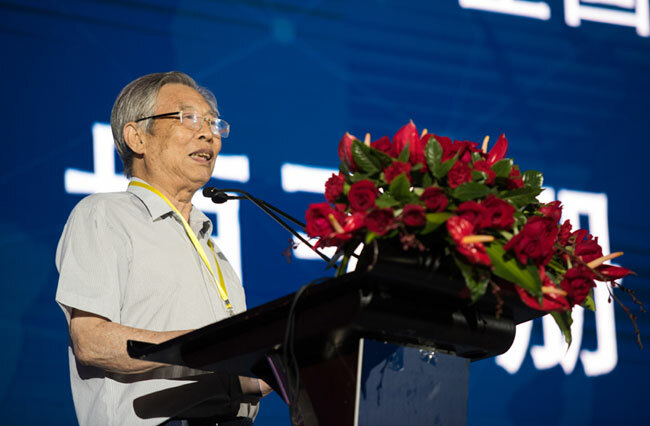Breakthrough in Guangdong could revolutionize logistics worldwide
Jul 09, 2017
“The Intelligent Logistics Express is a world first and a triumph for Chinese creativity."

PIC: Bardeen Lai (2nd left) CTO of iBosst shows guests the Intelligent Logistics Express system in Guangzhou, China. (AFP)
LOGISTICS
A new automatic goods delivery system constructed in Guangdong province could soon revolutionize logistics worldwide, according to its inventor.
The "Intelligent Logistics Express", built by Guangzhou-based firm iBosst, in Huazhou, Maoming, is a 15km long network of cables suspended at street lamp height on which small robot containers of 100kg capacity can travel.
The fully automated system uses GPS to track individual containers which can move to any destination served by the network at high speed, with low energy consumption and cost.
Ma Yasheng, chairman of iBosst, heralded the public unveiling of the new system as a milestone in China's push to become a global technological innovator.
"The Intelligent Logistics Express is a world first and a triumph for Chinese creativity," Ma said at a launch event held in Guangzhou, adding, "I firmly believe in the future people will have their entertainment demands satisfied through the Internet and their material demands through iBosst's intelligent logistics network - the completion of the world's first intelligent logistics express means not an end, but a new start.

VIPs take to the stage for the Intelligent Logistics Express system launch. (AFP)
Ma added that the system showed "proof of concept" and talks were already underway to construct similar networks in other Chinese locations, with foreign buyers also interested.
He also emphasized that at the current time, a great deal of research and development was going into drone systems for the delivery of goods in rural areas, but that the Intelligent Logistics Express had obvious advantages over other systems, such as far superior carrying capacity and fewer operational safety concerns.
"I hope this new transport system can be accepted so it's full potential can be realised," said Ma, adding, "When the train was first invented, people said it was a "strange beast" which would never be successful but history shows rail revolutionized travel and I believe our new system can have the same effect."
According to a recent public statement from Zhang Guohua, Director of NDRC's Transportation Planning Institute of China Center for Urban Development, the current trend in the logistics sector is a shift from "large volumes with fewer deliveries", which is costly and inefficient, to "small volumes with more deliveries".
The Intelligent Logistics Express of iBosst, is said to able to simultaneously satisfy the four demands of an optimal logistics system - "flexibility, punctuality, fast speed and low cost", solving the core problem of high cost facing the logistics sector.
It is also believed the new system can power a substantial upgrade of China's entire logistics sector, including investment in intelligent warehousing, infrastructure, as well as large scale manufacturing opportunities for building networks all over China.
"The ‘Intelligent Express' project is not simply an innovative tool for logistics transportation, it can also bring about a series of secondary and tertiary innovations," iBosst said in a statement, adding, "For example, developing cloud-based intelligent systems, establishing a nationwide control and dispatch system, and the integrated optimization of big data platforms, are the biggest advantages of this project."

Huan Yushan,former Vice Minister of the Materials department and former Vice Chairman of the All China Federation of Industry and Commerce speaking at the launch. (AFP)
Changing logistical trends in recent years have placed a strain on existing infrastructure. The rise of e-commerce has seen a huge increase in deliveries of goods and services direct to homes and offices.
Whilst e-commerce brings convenience to consumers, it comes at a price - increased congestion of roads, pollution, and slower delivery speeds, which has restricted the growth of certain sectors, such as perishable goods.
iBosst believe the Intelligent Logistics Express can solve these problems in suburban and rural areas, where networks can be built at a cost of around RMB 100,000 per km.
The system's operating cost, compared to traditional delivery services in China, which require a driver and a vehicle each time, is "virtually free" according to Ma.
The system is fully weather-proof and also operates on a two-way basis - residents and business connected to the network can use it to send as well as receive.
For example, iBosst say farmers in agricultural areas can send their products thereby increasing the size of their market - perishable goods moved more quickly means more potential buyers can be reached before freshness becomes an issue.
To this end, iBosst revealed it had signed strategic cooperation agreements with the Cloud Computing Center of the Chinese Academy of Sciences and with the People's Government of Huazhou.
iBosst says it will continue developing the system in an effort to establish "intelligent logistics in every village in China."
